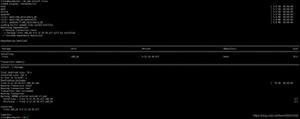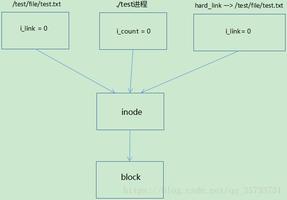使用du命令查找Linux中文件和目录的大小
du(或“disk usage”)命令是一个Linux命令,它可以打印目录中的文件列表,包括它们的大小,甚至可以汇总这些信息。如果您想查看一组文件有多大,并提供比ls命令更多的有关目录的信息,那么它非常有用。
在目录中使用du将显示该目录下所有文件和目录的大小(以字节为单位),包括当前目录的大小。要使du产生更可读的结果,只需使用-h标志将文件大小设置为可读格式。您还可以使用-c标志生成找到的所有大小的总计,-s标志仅显示总计。-a标志可以用来显示所有的文件和目录,去掉它只显示目录。
第一次在目录上使用du时,它将花费比后续运行更长的时间,因为每个大小分析的结果都会被缓存。
这是du命令在使用中的一些示例。
以人类可读的格式获取当前目录下目录的大小。
$ du -h2.2M ./directory
2.4M .
以人类可读的格式获取当前目录下所有文件和目录的大小。
$ du -ha2.0M ./directory/file5.txt
184K ./directory/file4.txt
2.2M ./directory
4.0K ./script.php
4.0K ./file2.txt
0 ./empty.file
4.0K ./file1.txt
184K ./file3.txt
2.4M .
显示当前目录下所有文件和目录的大小的摘要。
$ du -s2420 .
以易于阅读的格式显示当前目录下所有文件和目录的大小的摘要。
$ du -sh2.4M .
查看特定类型的所有文件的大小以及找到的文件的总大小。
$ du -cha *.php4.0K script.php
4.0K total
以易于阅读的格式查看当前目录中所有文件和目录的大小。
$ du -sh *2.2M directory
0 empty.file
4.0K file1.txt
4.0K file2.txt
184K file3.txt
4.0K script.php
以易于阅读的格式查看当前目录中所有文件和目录的大小,以及找到的总大小。
$ du -csh *2.2M directory
0 empty.file
4.0K file1.txt
4.0K file2.txt
184K file3.txt
4.0K script.php
2.4M total
以易于阅读的格式查看当前目录中所有文件和目录的大小,并按大小对输出进行排序。
$ du -hs * | sort -h0 empty.file
4.0K file1.txt
4.0K file2.txt
4.0K script.php
184K file3.txt
2.2M directory
这是此命令可用标志的列表。您可以使用--help标志在系统上看到此列表。
-a, --all write counts for all files, not just directories--apparent-size print apparent sizes, rather than disk usage; although
the apparent size is usually smaller, it may be
larger due to holes in (`sparse') files, internal
fragmentation, indirect blocks, and the like
-B, --block-size=SIZE scale sizes by SIZE before printing them. E.g.,
`-BM' prints sizes in units of 1,048,576 bytes.
See SIZE format below.
-b, --bytes equivalent to `--apparent-size --block-size=1'
-c, --total produce a grand total
-D, --dereference-args dereference only symlinks that are listed on the
command line
--files0-from=F summarise disk usage of the NUL-terminated file
names specified in file F;
If F is - then read names from standard input
-H equivalent to --dereference-args (-D)
-h, --human-readable print sizes in human readable format (e.g., 1K 234M 2G)
--si like -h, but use powers of 1000 not 1024
-k like --block-size=1K
-l, --count-links count sizes many times if hard linked
-m like --block-size=1M
-L, --dereference dereference all symbolic links
-P, --no-dereference don't follow any symbolic links (this is the default)
-0, --null end each output line with 0 byte rather than newline
-S, --separate-dirs do not include size of subdirectories
-s, --summarize display only a total for each argument
-x, --one-file-system skip directories on different file systems
-X, --exclude-from=FILE exclude files that match any pattern in FILE
--exclude=PATTERN exclude files that match PATTERN
-d, --max-depth=N print the total for a directory (or file, with --all)
only if it is N or fewer levels below the command
line argument; --max-depth=0 is the same as
--summarise
--time show time of the last modification of any file in the
directory, or any of its subdirectories
--time=WORD show time as WORD instead of modification time:
atime, access, use, ctime or status
--time-style=STYLE show times using style STYLE:
full-iso, long-iso, iso, +FORMAT
FORMAT is interpreted like `date'
--help display this help and exit
--version output version information and exit
Display values are in units of the first available SIZE from --block-size,
and the DU_BLOCK_SIZE, BLOCK_SIZE and BLOCKSIZE environment variables.
Otherwise, units default to 1024 bytes (or 512 if POSIXLY_CORRECT is set).
SIZE may be (or may be an integer optionally followed by) one of following:
KB 1000, K 1024, MB 1000*1000, M 1024*1024, and so on for G, T, P, E, Z, Y.
以上是 使用du命令查找Linux中文件和目录的大小 的全部内容, 来源链接: utcz.com/z/338879.html









